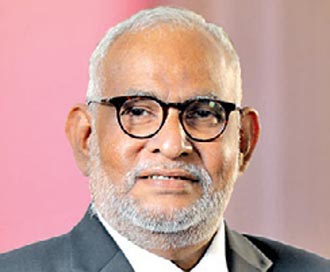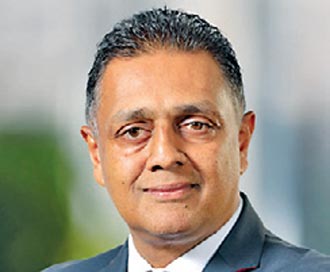Monday Feb 16, 2026
Monday Feb 16, 2026
Tuesday, 15 August 2023 00:57 - - {{hitsCtrl.values.hits}}
 |
| Chairman J. Durairatnam |
 |
| Director/CEO Thimal Perera
|
DFCC Bank said yesterday it continued its commitment to serving customers across the country, delivering high-quality customer centric banking services, despite the volatile and challenging economic environment and the bank has recorded a resilient performance for the first half of 2023.
DFCC Bank PLC, the largest entity within the Group, reported a Profit Before Tax (PBT) of Rs. 5,110 million and a Profit After Tax (PAT) of Rs. 3,205 million for the period ended 30 June 2023.
This compares with a PBT of Rs. 331 million and a PAT of Rs. 513 million in 1H of 2022.
The Group recorded a PBT of Rs. 5,867 million and PAT of Rs. 3,923 million for the period ended 30 June 2023 compared to Rs. 690 million and Rs. 824 million, respectively, in 2022. All the member entities of the Group made positive contributions to this performance. The bank’s Return on Equity (ROE) increased to 10.52% during the period ended 30 June 2023 from 5.04% recorded for the year ended 31 December 2022. The bank’s Return on Assets (ROA) before tax for the period ended 30 June 2023 is 1.62% compared to 0.46% for the year ended 31 December 2022.
The bank’s Net Interest Income (NII) increased 41% over Q2 of 2022 to reach Rs. 15,475 million by the end of June 2023. Both deposit and lending interest rates have continued to adjust downwards with the market guidance provided by the Central Bank, along with improvement in liquidity conditions of the domestic money market. While lower interest rates may have resulted in reduced interest income and expenses, in nominal terms, Net Interest Income (NII) has continued to improve as a metric during the period under review, as a result of the time lag in repricing existing deposits and the lending portfolio, and due to the bank’s strategy of investing in high-yield Government securities. Strategically, the bank thus increased its fixed-income investment portfolio, contributing significantly to increased interest income. The interest margin increased from 4.43% in June 2022 to 5.48% by June 2023.
The bank’s dynamic strategies and the efforts of its dedicated teams led to increased remittances, trade-related commissions, and other fee income lines, which contributed to the increase in non-funded business during the period. Fee income generated by credit cards also increased significantly, in line with the volume of the transactions. Accordingly, net fee and commission income have increased by 64% to Rs. 1,945 million for the period ended 30 June 2023, compared to Rs. 1,183 million for the comparative period in 2022.
The impaired loan (stage 3) ratio increased from 4.36% in December 2022 to 5.58% as of 30 June 2023, a continuation of the prevalent trend amidst the present economic conditions. However, the bank expects this trend to moderate and potentially improve towards the end of the year, reflecting positive developments in the macroeconomic environment, coupled with the bank’s concerted efforts with regard to recoveries. To address the current and potential future impacts of the present economic conditions on the lending portfolio, the bank made adequate impairment provisions during the period by introducing changes to internal models to account for unseen risk factors in the present highly uncertain and volatile environment including additional provisions made for the bank’s exposure to risk elevated sectors.
The bank has used significant judgement using the information available as at reporting date to estimate the recoverable value of foreign currency denominated investment securities issued by Government of Sri Lanka. Accordingly, an impairment charge has been recognised to maintain a provision cover of 42% on above investments. Accordingly, with these provisions made to address the additional risks in the economic environment, the impairment charge recorded an increase of 19% against the comparative period, thus standing at Rs. 8,096 million, for the period ended 30 June 2023, compared to Rs. 6,808 million in the comparable period. Operating expenses for the period ended 30 June 2023 rose primarily due to the increase in inflation.
However, the bank has taken numerous cost control measures within the bank, resulting in operating expenses being curtailed and managed at these levels.
Changes in fair value of investments in equity securities and fixed income securities (treasury bills and bonds) and movement in hedging reserves are recorded through other comprehensive income. Due to the application of hedge accounting, the impact on the total equity of the bank due to exchange rate fluctuation was minimised. A fair value gain of Rs. 2,759 million was recorded on account of equity securities outstanding as at 30 June 2023. The increase in the share price of Commercial Bank of Ceylon PLC during the period was the main contributor to the reported fair value gain in equity securities. The favourable movement in Treasury bill and bond yields also resulted in a fair value gain of Rs. 2,344 million during the period.
Despite the challenges faced by the economy and the banking sector, DFCC Bank’s total assets increased by Rs. 8.1 billion, recording a growth of 1.42% from December 2022. In line with the bank’s growth strategy and the present economic climate, an increase in investment in fixed income securities, combined with positive fair value movement in both fixed income securities and equity securities, has contributed to a 91% increase in investment in financial assets at fair value through other comprehensive income as of 30 June 2023 compared to the balance as of 31 December 2022. With increased provision for expected credit losses, appreciation of the Sri Lanka Rupee compared to 31 December 2022 and considerable economic challenges, the net loan portfolio was recorded at Rs. 342 billion as at 30 June 2023, which is 7% lower than the balance as at 31 December 2022.
The bank’s deposit base experienced a growth of 3.21% during the period, recording an increase of Rs. 11.9 billion to Rs. 382 billion, up from Rs. 370 billion as at 31 December 2022. This resulted in recording a loan-to-deposit ratio of 100.39%. Further, the CASA ratio was 19.75% as at 30 June 2023. The bank’s funding costs were also contained using medium to long-term concessionary credit lines, primarily used to grow the lending portfolio. Taking into consideration these concessionary term borrowings, the CASA ratio further improved to 30.76% and the loans-to-deposit ratio improved to 89.60% as at 30 June 2023.
DFCC Bank’s total equity increased to Rs. 59 billion as at 30 June 2023, supported by favourable movements in the equity portfolio and fixed income security portfolio classified as fair value through other comprehensive income, and positive movements in the hedging reserve, together with the recorded profit after tax of Rs. 3.2 billion. Accordingly, Tier 1 and Total Capital ratios recorded 10.085% and 13.148%, respectively as at 31 December 2022 improved to 11.416% and 14.085%, respectively by 30 June 2023.
The bank’s Net Stable Funding Ratio (NSFR) was 131.77%, and Liquidity Coverage Ratio (LCR) – all currency – was 305.06% as at 30 June 2023 compared to 126.55% and 202.34% respectively as at 31 December 2022. All these ratios were thus maintained well above the minimum regulatory requirement.
Director/CEO Thimal Perera said: “As we reflect on our performance in the first half of 2023, DFCC Bank PLC is pleased to report strong financial results across all business areas. Sri Lanka’s resilient and adaptable economy and our commitment to innovation, operational excellence, and customer-centricity continue to pay off, as evidenced by our steady revenue growth and increased profitability. We are confident that our robust growth strategy and prudent risk management practices will enable us to continue delivering sustainable value to our stakeholders in the long term, helping to support Sri Lanka’s economy as it enters into a period of significant recovery, supported by strong macroeconomic fundamentals.”